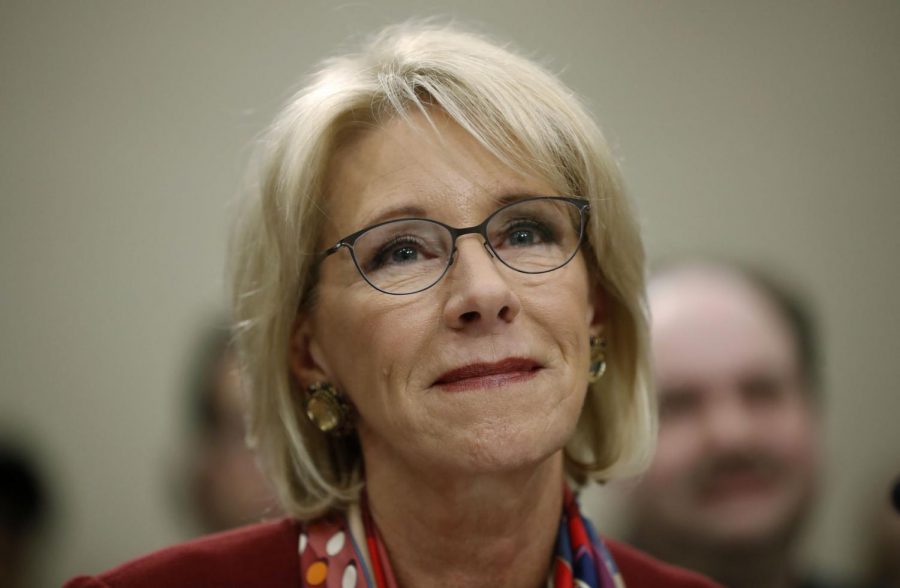Devos’ proposed cuts rejected, Federal bill increases higher ed spending
Education Secretary Betsy DeVos waits to testify before a House Committee on Appropriation subcommittee hearing on Capitol Hill in Washington, Tuesday, March 20, 2018. (AP Photo/Pablo Martinez Monsivais)
April 2, 2018
DeKALB — The latest federal spending bill has rejected all of President Donald Trump’s and, U.S. Secretary of Education, Betsy DeVos’, initial proposals to higher education.
Initial attempts to cut the education budget would have frozen the amount students can receive from Pell Grants and cut loan forgiveness programs for public servants, like teachers. It also would have cut the subsidized loan program in which the government pays the interest on the loan for students while they are still in school.
In passing the newest version of the Consolidated Appropriations Act of 2018, the House of Representatives has rejected these proposals and many other education-related proposals put forth by DeVos.
The Consolidated Appropriations Act of 2018 is a house bill released to the public on March 21. It is an omnibus spending bill outlining a $1.3 trillion increase in spending for the federal budget. It contains a $4 billion increase for the Department of Education.
In the 2016 academic year, 10,577 students received student loans averaged at about $10,400 each, according to the 2016-17 NIU Data Book.
An omnibus spending bill annually decides government programs’ funding for the year. This bill was passed by the Senate just before the March 23 deadline. Had it not passed, there would have been a government shutdown.
During a government shutdown, the Office of Budget and Management decides which government operations remain open. All non-essential operations performed by the government cease operation. Emergency services remain operational, but services like national parks, the Department of Motor Vehicles and other federal offices remain closed until there is a budget. Had this deadline passed without action, it would have been the second shutdown since January.
Trump and DeVos’ budget proposal would have froze the amount students can receive from Pell Grants, which was a maximum of $5,775 in 2016, according to their Feb. 13 joint proposal. The original plan was to limit funds available to students to $5,036; the amended bill increases the amount students are eligible to receive to $6,095.
“[DeVos] is not one who does much for the students, I’d have to say,” said Evan Blankenberger, sophomore political science major. “She seems to be trying to take away as much as she can from college students in the United States.”
The bill also contains reauthorizations for programs the United States is already running, like intelligence programs, an extension of the Temporary Assistance for Needy Families program and Medicaid funding for Puerto Rico.
While subsidized loans and student loan forgiveness programs have survived this round of fund appropriation, they may see more contention after the house makes a decision on the Prosper Act, a reauthorization of the Higher Education Act of 1965, which would merge subsidized and unsubsidized loan programs into one.
“I think they need to just keep standing up to the president,” Blankenberger said. “It’s more a ‘Trump and his cabinet’ position to be so anti-student and anti-financial aid. So, I think the Republicans need to just stand up to them when they’re wrong, and I think they did that.”







